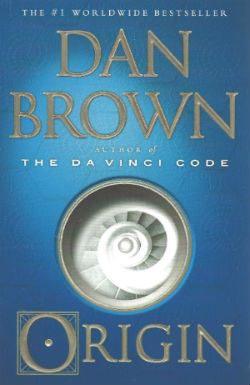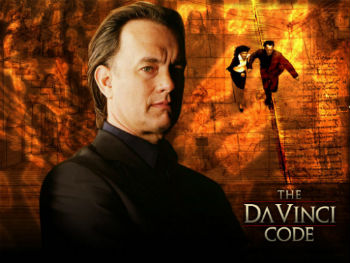Dan Brown Lets Us Down
By Neil Earle

Everyone should belong to a Book Club, especially of you’re quasi-retired.
Mine in Cordova TN in the Memphis suburbs has the kindest, warmest little group which is just what you need on a frosty morning in Dixie.
This week I got to report on Dan Brown’s latest book “Origin” which begins with a priest, a rabbi and an imam (not a joke) being told by an Elon Musk-like computer genius that he has uncorked the two greatest questions:
Where we human beings came from.
Where we are going.
How’s that for openers? The Musk-Bill Gates composite character, Edmond Hirsch, is a quantum computer genius who is able with the technology to replicate the beginning and the end. Hence the meeting with the three holy men as prep for his revelation of secrets that will virtually destroy the world of religion.
Brown’s opus is a bit disappointing this time out, more than infuriating. Brown threw down the gauntlet to the world of religion with the 2006 movie The Da Vinci Code (based on Brown’s best-seller). That effort was easily answered in that he was recycling old second century heresies about an improper relationship between Jesus Christ and Mary Magdalene.
This time his premise collapses of its own weight but along the way you can learn about the truly amazing advances that are being done in AI – Artificial Intelligence. A leading character in the book is Hirsch’s quantum computer based on HAL in the 2001 movie.
 Tom Hanks is Dan Brown's favorite hero as his Stephen Langdon.
Tom Hanks is Dan Brown's favorite hero as his Stephen Langdon.Chemical Soup Revisited
Of course as a Christian pastor I was intrigued at the two premises that would supposedly rock the world of religion. Brown’s laying out of a computer model reconstruction builds upon the old 1952 Miller-Urey chemical soup project that tried to replicate life by “spontaneous generation” in a laboratory experiment. It didn’t work of course because we would have heard more about it but in the novel Hirsch claims to have perfected the experiment.
This is why he invited his old professor and Dan Brown hero Professor Stephen Langdon (played by Tom Hanks in the movies) to Spain for the truly impressive computer-generated presentation.
To quote the book: “Life arose spontaneously from the laws of physics.” It was Miller-Urey’s amino-acid experiments sped up by the kinetic processes of evolution of course – the speculative progress from the primordial soup. This is Letdown Number One. But what can a novelist do? Show us how to create life?
Hmm. Intriguing question, eh?
From Nowhere and Everywhere
“The truth is we come from nowhere…and from everywhere. We come from the same laws of physics that create life in our corner of the cosmos. We are not special. We exist with or without God. Life is not the point of the universe. Life is simply what the universe creates and reproduces in order to dissipate energy.”
Apart from the modern-speak such as the dissipation of energy jargon we are not that far along from Heraclitus and the Greeks: "In the beginning was Necessity.” We came from the natural outworking of material processes that continue ineluctably, blindly from the beginning.
Not much progress here in 2500 years, Dan.
And where is life going?
In brief we are, says Hirsch-Brown, already developing as a hybrid species. We are already seeing a fusion of biology and technology in the form of blue tooth apparatus, hearing aids inserted, dental implants, progress in cryonics and smart phones and artificial limbs and bionic arms to the point that (and I quote) “we are incorporating this into our bodies so that we can no longer consider ourselves as [just] homo sapiens.”
And that's where we are going in the World According to Brown.
Remembering Kurt Godel
Brown has Langdon doubt within himself if these revelations would deal a death blow to faith. And he is right for other reasons beyond his that Christians and believers might understand. In Origin Dan Brown teases us across nearly 600 fast-moving and fairly entertaining pages till we reach this box canyon. There is a lot of "fancy Dan" pirouetting around quantum computers and the new brain-teaser of AI and the bewitching ghost of Silicon Valley but…in the end Origin can’t escape the surly bonds of earth and collapses back on its own speculative weight. Its flaw is what mathematician Kurt Godel saw in the 1930s. “You cannot really explain a system from a point of origin within the system.” There must be an outside point of reference.
That implies – for most believers – a Higher Power. Albert Einstein knew Gödel well and was inclined to frame his own researches into the mysteries of the cosmos as “thinking God’s thoughts after him.” The result was some of the most fruitful breakthroughs in the history of science. Dan Brown’s agenda is running in the opposite direction. Just his cast of sinister archbishops and heretical Popes in Origin shows again there is something about religion he doesn’t like even as he gives us some dazzling side-shows along the way trying to imagine creation without a Creator.
However, his novels do give us believers a regular platform to appreciate the wisdom in the old Book that read “the intelligence of the intelligent I will frustrate.”
Of course Brown’s latest book disappoints and frustrates on the Big Questions. At $16.95 could I expect anything else?